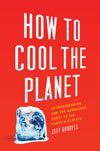 Manmade carbon dioxide emissions are knitting a wooly blanket around the planet at a time when we really need to throw off the covers. Yet even if we could stop driving, manufacturing things and producing dirty power, it may be too late: climate scientists agree that without major intervention, existing CO2 will keep warming the planet for the rest of the century.
Manmade carbon dioxide emissions are knitting a wooly blanket around the planet at a time when we really need to throw off the covers. Yet even if we could stop driving, manufacturing things and producing dirty power, it may be too late: climate scientists agree that without major intervention, existing CO2 will keep warming the planet for the rest of the century.
A potential solution is geoengineering, says Jeff Goodell, who appeared at RiverRun Bookstore Wednesday for his new book “How to Cool the Planet.” The Rolling Stone/New York Times Magazine contributor’s previous book is “Big Coal: The Dirty Secret Behind America’s Energy Future” (2006).
We have the technology, he says. We can brighten clouds or blow tiny sulfur mirrors into the atmosphere to deflect sunlight from the earth’s surface. Deflecting 1 to 2 percent of sunlight would offset the warming effect of doubling today’s carbon emissions. We can also sequester CO2 by tossing iron in the ocean, thereby feeding plankton that will consume CO2 in photosynthesis and sink to the ocean floor. Oh, and there are tree-like machines that suck carbon from the air.
So how does this sound? Like a quick fix? Like Star Wars (the missile shield)? Like a threat to our spiritual integrity?
“Reaganesque,” said one young man in the audience, almost certainly born after the 40th president left office.
 Goodell understands the anxiety. He’s conservation-minded himself and, in fact, headed to the Arctic Circle this weekend to better understand the warming threat. Geoengineering was “science fiction writ large” until he talked to enough smart people to conclude that we don’t have the luxury of being properly appalled. We’re staring down calamity.
Goodell understands the anxiety. He’s conservation-minded himself and, in fact, headed to the Arctic Circle this weekend to better understand the warming threat. Geoengineering was “science fiction writ large” until he talked to enough smart people to conclude that we don’t have the luxury of being properly appalled. We’re staring down calamity.
Some of his conclusions:
Geoengineering is dangerous politically. A quick fix is precisely what some people like. As the ink on the book dried, he got a delighted call from the nation’s biggest fossil-fuel lobbyist. “We love your book!” Gulp.
Worse, geoengineering could enable rich individuals or states to act unilaterally to manipulate the climate. It’s like nuclear weapons: “How do you keep the crazy person’s finger off the trigger?”
Geoengineering will happen sooner or later. We’re in a position where we’ll have to consider this at some point, he says. We should start talking about it now.
Worse than technological hubris is human apathy. “The real risk is being fat dumb and stupid a lot longer and riding into this superheated world without any heed,” he says.
Ultimately, Goodell concludes that we are, like it or not, a species that manipulates our environment. Do you own an air conditioner? Do you like heat in the winter? He works another metaphor beautifully: I’ve discovered that the people who understand this best are gardeners. I’m not much of a gardener myself, but I am married to one. My wife, Michele, is happiest when she has dirt under her fingernails, and one of her highest aspirations in life is to grow all our own food. It’s because of her that our kids have such a heightened sensitivity to the freshness of green beans that they can take one bite and tell you, with a good chance of being correct, whether the bean is store-bought or homegrown.
My wife’s garden is, by any standard, a product of human artifice. There is nothing “wild” about it, nothing undisturbed, nothing left alone. She has planted every plant and mixed the soil to her liking with imported alpaca manure. The garden is entirely organic – she’s no more likely to use Miracle-Gro than she is to dye her hair pink – but it is also entirely human. It is an artifact, but it is a living artifact. You do not walk through her vegetable garden and admire the basil and the asparagus an feel that nature has been banished.
Compelling thought indeed, but still, it’s just Goodell’s backyard.
I want to learn more. And as a professional communicator, I’m eager to see how geoengineering alights on our national radar screen. I cringe at the possibility (certainty?) that politicians and pundits will get hold of this and club one another silly with it, as with health care. And despite my status as a card-carrying independent, the possibility (certainty?) of the profit motive getting further entangled with the fate of the planet concerns me.
Can we start a conversation on geoengineering? Should we start one? If so, how?